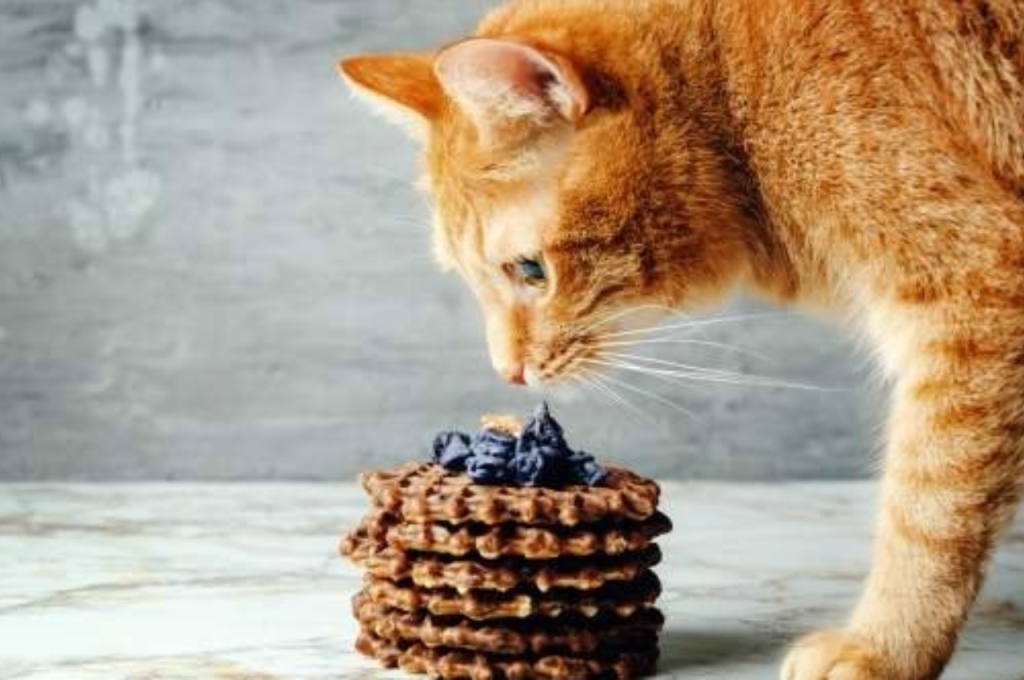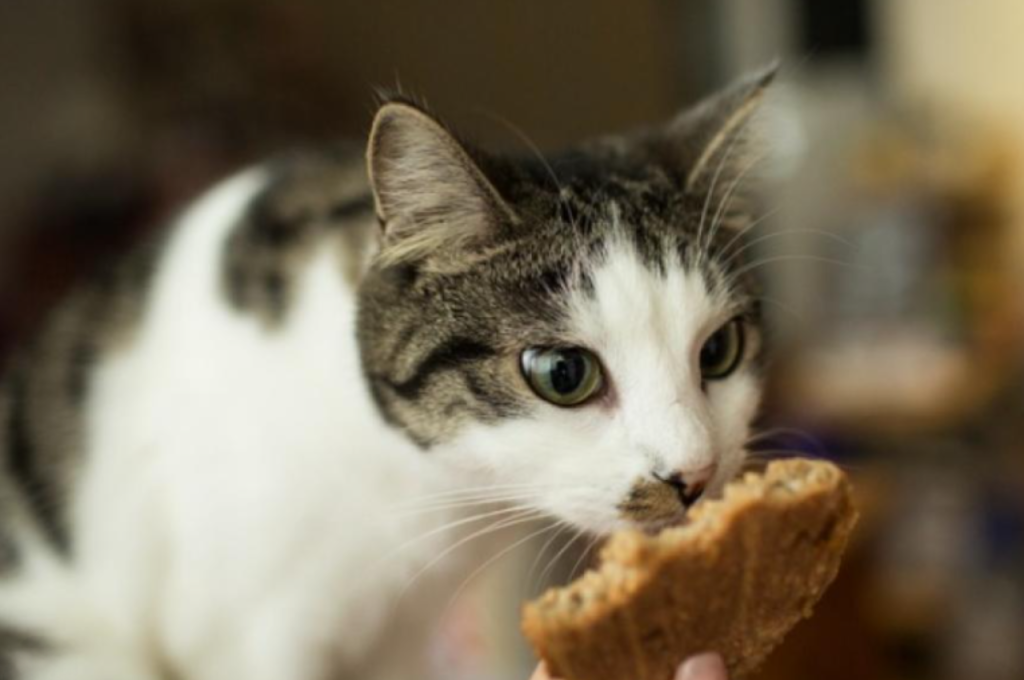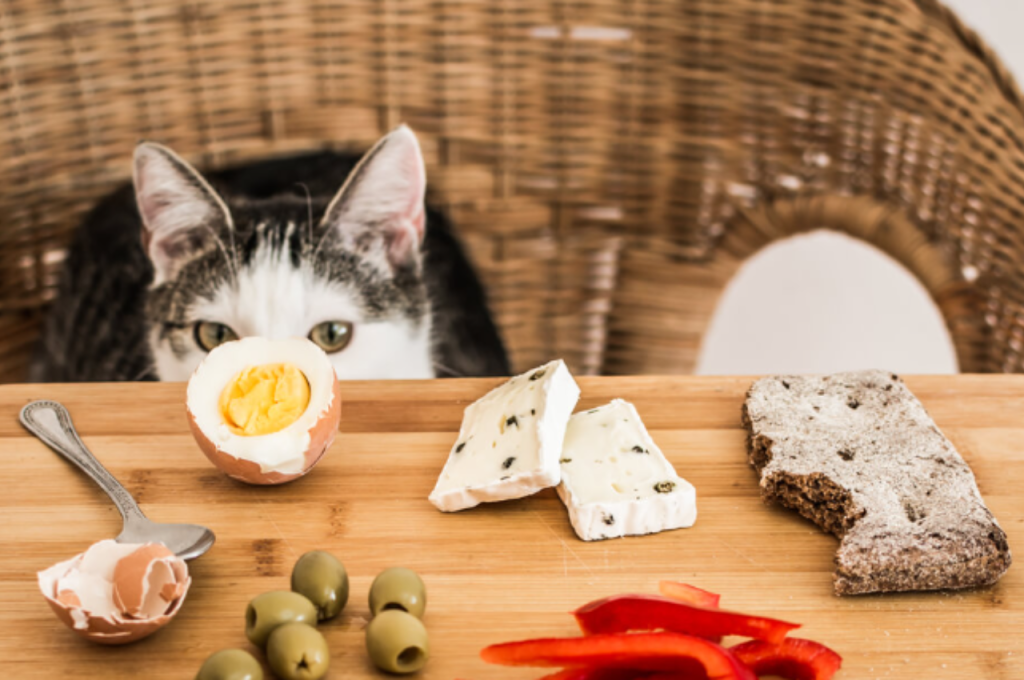It’s essential to understand that cats should avoid consuming sweets due to the potential risks they pose to their health. Cats lack the necessary enzymes to break down the sugar in sweets, leading to digestive issues and potential weight gain.
Additionally, certain ingredients in sweets, such as chocolate and artificial sweeteners like xylitol, can be toxic to cats. Providing cats with a balanced diet tailored to their nutritional requirements is crucial for maintaining their overall health and well-being.
The Curiosity of Cats
Cats are naturally curious animals. They like to explore new smells and tastes. Whether it’s the scent of food or something interesting in the house, they’re always eager to investigate. Playing with them and giving them toys to explore can make them happy. In this article, we’ll delve into the curious behavior of cats and explore the reasons behind their natural curiosity.

Feline Taste Buds
Cats have about 475 taste buds, compared to humans’ 9,000. Cats are predominantly carnivorous, and their taste buds are geared towards detecting meaty flavors.
Natural Diet
A cat’s natural diet consists of protein-rich meats. Their bodies are not adapted to process sugar in the same way that humans can.
Can Cats Taste Sweetness?
Yes, cats can taste sweetness, but they lack the taste receptors for it. Due to this, they do not crave or require sweet treats in their diet. Consuming sweets can potentially lead to health issues, such as obesity and dental problems, for cats.
In the world of human food, sweetness is a universally loved sensation. From indulging in a piece of chocolate to enjoying a scoop of ice cream, we humans savor the taste of sweetness. But what about our feline friends? Can cats taste sweetness? Let’s delve into the fascinating world of cat taste buds to find out.
Understanding Cat Taste Buds
Cats have a remarkably different sense of taste compared to humans. While humans have around 9,000 taste buds on their tongues, cats have fewer taste buds, roughly around 473. These taste buds are mostly concentrated on the tip and side edges of their tongues. You might wonder what this means for their perception of sweetness.
Cat taste buds are primarily designed to appreciate protein-rich foods. Their taste receptors are highly sensitive to amino acids, which are the building blocks of protein. This explains why cats are typically drawn to savory flavors rather than sweet ones. Unlike humans, cats lack the necessary taste receptors to fully detect and appreciate sweetness.
Sweet Aversion in Cats
It’s not just that cats cannot taste sweetness; they also have an inherent aversion to it. The bitter taste of sweet substances can be unappealing and even nauseating to cats. This aversion might be an evolutionary response, as sweet substances are rarely found in their natural carnivorous diet.
Moreover, certain sweeteners, such as xylitol, can be toxic to cats. Xylitol is commonly found in sugar-free gum, candies, and other human foods. Ingesting even a small amount of xylitol can lead to a dangerous drop in their blood sugar levels and result in liver failure.
Therefore, it’s crucial to be cautious and avoid offering your feline companion any sweet treats. Instead, opt for cat-friendly snacks and treats specially formulated to suit their nutritional needs.
The Dangers of Sweets for Cats
Sweets may be a delightful treat for us humans, but when it comes to our feline friends, indulging in sugary treats can lead to serious health risks. Cats have different dietary needs and metabolic processes compared to humans, making certain sweets toxic for them. In this article, we will explore the dangers of sweets for cats, focusing on the health risks and common sweet ingredients that are toxic to our furry companions.
Health Risks of Sweets
Feeding your cat sweets can have detrimental effects on their health. Cats are obligate carnivores, which means their bodies require a high-protein diet. Introducing high-sugar foods can disrupt their natural metabolism and lead to various health issues, including:
- Obesity: Cats are prone to gaining weight quickly, and the excess sugar in sweets can contribute to obesity, increasing the risk of other health problems.
- Dental Problems: Sugary treats can cause tooth decay and gum disease in cats, leading to pain, discomfort, and potential tooth loss.
- Diabetes: Feeding your cat sugary foods can lead to insulin resistance and the development of diabetes, a chronic condition that requires lifelong management.
Common Sweet Ingredients Toxic to Cats
Some sweet ingredients that are commonly found in human foods can be toxic to cats. It’s important to be aware of these ingredients and avoid exposing your cat to them. Here are a few examples:
| Ingredient | Effect on Cats |
| Chocolate | Contains theobromine, which can cause severe heart and nervous system problems in cats. |
| Xylitol | This artificial sweetener can cause a sudden drop in your cat’s blood sugar levels, leading to hypoglycemia and liver damage. |
| Raisins and Grapes | These fruits can cause kidney failure in cats, even in small amounts. |
Remember, even small quantities of these ingredients can pose a significant risk to your cat’s health. It’s crucial to keep all sweets and potentially harmful food items out of your pet’s reach.
While it’s natural to want to share a sweet treat with your furry companion, it’s essential to prioritize their well-being and stick to a diet that meets their nutritional needs. If you suspect that your cat has ingested something toxic or is experiencing any health issues, consult your veterinarian immediately for proper guidance and care.
When Sweets are Harmless
Cats have a reputation for being finicky eaters, but their curiosity might lead them to show an interest in sweet treats. While cats are obligate carnivores and don’t have a sweet tooth like humans do, some sweets can be safely given to them in moderation. It’s important to keep in mind that too much sugar can lead to health issues in cats, so it’s critical to be mindful of the type and quantity of sweets they consume.

Safe Sweet Treats for Cats
When it comes to giving cats sweets, it’s essential to stick to options that are safe for feline consumption. Some of the safe sweet treats for cats include:
- Fruits: Small amounts of fruits like mashed bananas, strawberries, and blueberries can be given as occasional treats. However, it’s important to remove any seeds, pits, or cores, as they can be harmful to cats.
- Plain Yogurt: Cats can enjoy plain, unsweetened yogurt in small quantities as it contains probiotics that can be beneficial for their digestive system.
- Coconut Oil: A small amount of coconut oil can be added to a cat’s diet as it may provide some health benefits, such as promoting a healthy coat and aiding in digestion.
Moderation is Key
When offering sweet treats to cats, moderation is crucial. Limit the amount of sweet treats and ensure they are only given occasionally to prevent any potential health issues. As with any new food introduction, it’s recommended to consult with a veterinarian to ensure the safety and appropriateness of the treats for your cat.
Signs of Sweet Poisoning in Cats
Cats can’t eat sweets, as they can experience sweet poisoning. Symptoms may include vomiting, diarrhea, lethargy, and even seizures. It’s crucial to keep all sugary treats away from your feline friend to ensure their safety and well-being.
Symptoms to Watch For
The signs of sweet poisoning in cats can vary depending on the type and amount of sweets consumed. It’s important to be aware of these symptoms so you can take appropriate action if you suspect your feline friend has ingested something harmful. Look out for the following signs:
1. Vomiting: Cats may experience bouts of vomiting after consuming sweets.
2. Diarrhea: Sweet poisoning can also lead to diarrhea in cats.
3. Lethargy: If your cat suddenly becomes unusually tired and lacks energy, it could be a sign of sweet poisoning.
4. Increased thirst: Cats may exhibit increased thirst as a result of consuming sweets.
5. Increased urination: Sweet toxicity can also cause an increase in urination frequency in cats.
Immediate Action Steps
If you notice any of these symptoms or suspect that your cat has ingested a potentially toxic sweet, it’s important to take immediate action to ensure their safety and well-being. Follow these steps:
1. Remove the sweet: If you see your cat ingesting a sweet, try to remove it from their mouth as quickly as possible. Be cautious and gentle to avoid being bitten or scratched.
2. Contact your veterinarian: Reach out to your vet immediately for professional guidance. Describe the situation and any observed symptoms.
3. Do not induce vomiting: Unlike with dogs, it is not recommended to induce vomiting in cats without veterinary advice.
4. Keep your cat hydrated: Offer fresh water to help flush out any toxins and to prevent dehydration.
5. Observe your cat closely: Monitor your cat’s behavior and symptoms. If their condition worsens or you notice any new symptoms, contact your vet promptly.
Remember, prevention is key when it comes to ensuring your cat’s health. Always keep sweets and other potentially toxic foods out of your cat’s reach to avoid any accidental ingestion. Regular check-ups with your veterinarian are also essential to keep your feline friend safe and healthy.
| Signs of Sweet Poisoning in Cats | |
| Symptoms to Watch For: | Immediate Action Steps: |
| VomitingDiarrheaLethargyIncreased thirstIncreased urination | Remove the sweetContact your veterinarianDo not induce vomitingKeep your cat hydratedObserve your cat closely |
Alternative Options for Cat Treats
For cat owners who are concerned about the potential health risks associated with giving sweets to their feline friends, there are alternative options for cat treats that can be both enjoyable and safe. By focusing on healthy cat treats and DIY cat-friendly snacks, you can provide your pet with delicious alternatives that cater to their dietary needs.
Healthy Cat Treats
When it comes to offering treats to your feline companion, it’s crucial to prioritize their well-being. Healthy cat treats can include small pieces of cooked chicken, turkey, or tuna. These protein-rich options not only provide a savory reward but also supply essential nutrients for your cat’s overall health.
- Small pieces of cooked chicken, turkey, or tuna
- Specialized cat treats with natural ingredients.
- Freeze-dried meat or fish treats
Diy Cat-friendly Snacks
If you’re looking to create personalized treats for your beloved pet, consider making DIY cat-friendly snacks at home. This allows you to control the ingredients and ensure that they align with your cat’s dietary requirements. Some DIY options include homemade catnip biscuits, salmon or tuna fritters, and frozen chicken broth bites.
- Homemade catnip biscuits
- Salmon or tuna fritters
- Frozen chicken broth bites
Curbing Your Cat’s Sweet Tooth
We often find ourselves tempted to share our favorite sweets with our feline companions. However, it’s crucial to understand that cats cannot taste sweetness and have no nutritional need for sugary treats. Feeding sweets to cats can lead to a variety of health issues, including digestive upset, weight gain, and even toxicity from certain ingredients. To help curb your cat’s sweet tooth and promote their overall health, consider the following tips:
Training for Healthier Eating Habits
Cats can enjoy sweet treats occasionally, but it’s essential to train them for healthier eating habits.
Feeding Guidelines
When offering sweet foods to your cat, stick to natural options like fruits in moderation as per feeding guidelines.
Consulting The Vet
As responsible pet owners, we strive to provide the best care for our feline companions. When it comes to addressing concerns about your cat’s health, behavior, or dietary needs, consulting with a veterinarian is essential. Here’s why scheduling regular veterinary check-ups and seeking professional advice are crucial for ensuring your cat’s health and well-being:

Advice from Professionals
Before giving any sweets to your cat, it’s crucial to consult your veterinarian to get personalized advice.
Vets can provide insights into your cat’s health condition and suitability of sweets.
Handling Sweet-related Issues
If your cat accidentally ingests sweets, watch out for symptoms like vomiting or diarrhea.
Inform your vet immediately for guidance on managing any related issues.
Conclusion
In short, cats should not eat sweets. While some cats may be attracted to the taste, it can be harmful to their health. The high sugar content in sweets can lead to weight gain, diabetes, and dental issues. Instead, it is best to provide cats with a balanced diet that meets their specific nutritional needs.
Keep your feline friends safe and healthy by avoiding the temptation to give them sweets.
